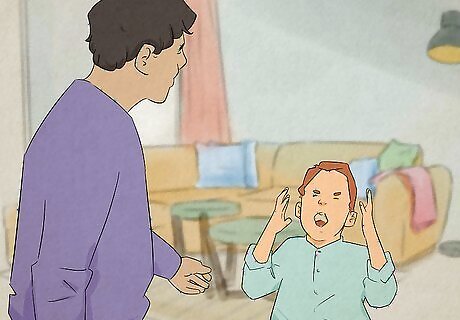
views
- When you feel angry, take a moment to breathe deeply, try to think rationally, use “I” statements, and focus on what you can control right now.
- Focus on practicing healthy habits to reduce stress that can lead to anger. Exercise regularly, build your self-esteem, and recognize potential triggers.
- Anger is a completely natural emotion, but if it hurts the people around you, consider reaching out to a therapist or mental health professional for help.
Practice active relaxation techniques.

Do deep breathing exercises to calm down when you're mad. If you’re sitting or standing, make sure your feet are both flat on the ground and hip-width apart. Breathe in through your nose, letting the air flow deep down into your belly. Count slowly from 1 to 5 as you breathe in and out. Repeat for at least 5 minutes, until you feel calm and peaceful. You can also try picturing a relaxing scene to help pull you out of stressful situations. Imagine the best possible ending to the conversation you’re about to have or recall a time when you and your children felt happy to be together.
Create a mantra.

Try repeating a mantra to calm your emotions. By remaining calm and cool-headed, you can choose how you want to react rather than reacting in anger. Repeating a short phrase in your mind can help soothe your mind and bring you down to the present moment. Here are some mantras that can help: “I can handle this.” “I can be angry, but I also want to help my child/spouse.” “This anger will pass.” “I love my child/spouse, and everything is okay.
Think before reacting.

Give yourself time to figure out what you want to say. In the heat of the moment, it can be easy to say something you don’t mean. Instead of saying the first thing that comes into your mind, take a moment to collect your thoughts. Pay close attention to what the other person is saying and take your time before answering. If you’re having an argument with your spouse, listen to what lies behind their anger. For example, if your spouse complains about how much you work, they might be trying to communicate that they’re feeling unloved or alone. Taking a breath before you react can save arguments from creating misunderstanding and spinning out of control. If your children’s behavior is making you angry, keep your child's development in mind so you can know if your expectations of them are realistic. For example, knowing that elementary-school-aged children tend to be restless can help you realize why your 8-year-old might be having difficulty sitting still during dinnertime.
Use humor to release tension and lighten the mood.

See the humor in every situation to alleviate tension and improve your mood. When you call someone a name, stop and picture what that would look like. For example, if you call your boss a “clown,” picture or draw out what that image brings to mind. If it’s appropriate, make a joke that will relieve tension between you and your spouse. When confronting an issue with your children, laugh and be silly afterward to show them you love them. If you’re confronting your child or spouse, avoid using sarcasm or teasing—this could hurt their feelings and make the situation worse.
Focus on what you can do.

Understand that some things may be out of your control. There may be issues that you can’t change—be kind to yourself and try to be realistic about the ones you can. Find alternative solutions to stressors during the day to keep your anger from boiling over, and remember that you can’t fix everything. If your daily commute across a traffic-jammed highway makes your blood rise, take some time before work to map out a more scenic or less congested route. Or, try taking the bus or riding a bike instead of driving. If your child’s grades are low, you may be consumed by anxiety about their future. Remember that their future is up to them, and you don’t have control over it no matter how hard you may try. Focus on what you can do now, and allow your child grace to handle the rest.
Identify potential solutions to the situation.

Instead of focusing on what’s making you mad, focus on the situation at hand. Don’t try to accomplish everything at once—set small goals you can easily achieve, and focus on how you handle the problem without letting your anger take the wheel. Take a deep breath, and remember that anger won’t fix anything. Does your child’s messy bedroom make you upset? Close the door. Do you feel frustrated that you’re cooking and cleaning all by yourself? Make an agreement with your partner or children to help each other with the cooking and cleaning each night, or agree to split up the work.
Express your concerns clearly and calmly.

Use “I” statements to de-escalate tension. In a tense conversation, criticizing or placing blame on the other person can worsen the situation. Instead, try to use “I” instead of “you” to focus on how the situation makes you feel. Remember to be specific and respectful toward the other person. When you’re talking to your children, say “I feel frustrated when you leave your toys on the dining room table” instead of “You always make a mess.”
Replace emotional thoughts with rational ones.

When you’re overwhelmed by anger, it can be difficult to think rationally. If you feel consumed by exaggerated emotional thoughts, try replacing them with logical ones. Instead of thinking, “Everything is ruined, why is my child always doing this?” tell yourself, “It’s frustrating and understandable that I’m upset about it, but it’s not the end of the world. Being angry doesn’t do anything to fix the situation.” Remember that children, especially young children, are most likely not trying to make you angry. Getting angry is normal and understandable, but remember that it’s your job to love them and make sure that your child knows where the limits are. Be careful about using words like “always” or “never” when talking to yourself or someone else. These words can not only make your anger feel justified, but they can hurt the feelings of others and in your mind, it can make the situation seem unchangeable.
Step away from the situation if necessary.

Give yourself a break when your anger becomes too much to handle. Allow yourself a few moments of quiet time during times of the day that often feel stressful. If you get home feeling overwhelmed or tired from your long day, take a break before dealing with a problem. Giving yourself short breaks can make you feel better equipped to tackle a situation without getting frustrated or angry. Before confronting an issue, give yourself 10 to 15 minutes to relax and engage in something you enjoy. Watch an episode of your favorite TV show, read a book, or simply sit outside for a little bit and breathe.
Accept your emotions.

Don’t judge yourself too harshly if your rage does boil over. Anger is a normal, human emotion—it doesn’t mean you don’t love your partner or children. If you do react in a way that’s too harsh, make sure to apologize and tell the other person what you wish you had said or how you wish you had reacted. If you’ve been angry around your children before, you might find that your kids mirror your mood or become more emotionally unstable. Without learning how to control your own emotions, your kids may end up becoming more quiet, fearful, aggressive, or rude at home and around others. Keep in mind that improving yourself takes commitment and time! The fact that you’re reading this article means that you care about the people around you and you’re looking to make changes for the better.
Identify potential triggers.

Remember that anger can be caused by external or internal events. You might be angry at a specific situation (your kid is pushing your buttons, your flight got canceled) or your anger could be a result of emotions that were already causing you stress (you’ve been anxious about work, a family member is sick). Knowing where your irritation comes from and recognizing that you’re angry can help you figure out how to control it. Anger is a reactive emotion, which means that there’s always another emotion underneath the surface that’s causing anger. Men tend to repress their feelings because they weren’t taught to express them correctly, and as a result, all of that emotion can come out as anger. Your heart may start pounding, or you might start clenching your teeth or fists. When you feel angry, take note of how your body reacts and count to 10. Figure out what’s making you upset, then try to respond to the situation after you’re completely calm. If your children’s behavior often triggers your anger, try pinpointing what’s making them act that way. Are they having trouble with friends at school? Are they tired or hungry? Are they testing your boundaries? By identifying the issue, you can possibly stop the trigger before it starts.
Cultivate a positive mental attitude.

Focus on caring for your mental health and building your self-esteem. Men often feel angry because they weren’t taught to process their emotions in a healthy way. Be kind to yourself when you feel self-critical and recognize what you’re good at, whether it’s cooking, dancing, or being a friend. When someone gives you a compliment, write it down on a list, and read over it when you have negative thoughts. If you feel overly tense, try taking a hot bath or splashing cold water on your face to center yourself. You can also try taking a short walk around the neighborhood or listening to soothing music.
Exercise.

Physical activity can help you relax and reduce stress. If you feel your anger escalate, try going for a short walk, run, or bike ride. Find an activity you like to do that you can do regularly to help you regulate your stress. Set aside time every week to engage in a physical activity you enjoy. It doesn’t have to be every day—start by going to the gym, taking a class, or going on a walk once a week when you have a little extra free time.
Seek out sources of support.

If you’re feeling overwhelmed, remember that there are people there to help. You don’t have to face your issues alone. Reach out to your spouse, your extended family, your close friends, or a support group for advice and encouragement. If your anger is having a negative impact on your life or your personal relationships, consider finding a psychologist or another licensed mental health professional. Counseling or therapy can help you develop techniques for managing your anger and staying positive during conflict.




















Comments
0 comment